Marriage, childbirth evoke fear, not joy among young South Koreans, study finds
Sign up now: Get insights on Asia's fast-moving developments

Marriage and parenthood are increasingly associated with fear and anxiety among South Korea’s younger generation.
PHOTO: REUTERS
SEOUL - Amid South Korea’s birth rate crisis, new support plans are unveiled, including ‘fast-track’ airport entry for large families, and affordable housing.
This comes as marriage and parenthood are increasingly associated with fear and anxiety among South Korea’s younger generation, according to an analysis released on March 11.
The analysis of posts on Blind, an online community for young workers, find that two-thirds of marriage-related posts carried emotions of “sadness”, “fear” or “abomination”.
Of these, 32.3 per cent displayed feelings of “sadness” while 24.6 per cent exhibited “fear” and 10.2 per cent were categorised under “abomination”.
On the other hand, only 9.3 per cent of the posts expressed happiness.
A similar trend could be observed for childbirth and child-rearing. According to the institute, over 60 per cent of childbirth-related posts carried negative emotions, with “abomination” leading at 23.8 per cent, followed by “fear” (21.3 per cent) and “sadness” (15.3 per cent). Nearly 70 per cent of posts about child-rearing exhibited such emotions.
The analysis was conducted by not-for-profit private-sector think tank Korean Peninsula Population Institute for Future. It was based on some 50,000 blind posts combined from December 2017 to November 2024 about marriage, childbirth or child-rearing.
Despite government efforts to reverse the country’s declining birth rate through a range of policies, the study indicated negative perceptions towards family life persist, reflecting deep-rooted societal and economic concerns.
The same analysis also showed that the word “money” appeared in nearly 30 per cent of all posts related to marriage and in 13.2 per cent of posts about childbirth.
Moreover, nearly 60 per cent of the marriage-related posts centred around the “preparations and conditions for marriage”, while almost 20 per cent of childbirth-related posts talked about “financial support related to childbirth”.
This came as South Korea showed signs of a rebound from the downtrend in its birth rate. On the average, the number of children born to a South Korean woman in her lifetime was estimated at 0.75 in 2024, up from 0.72 in 2023. It was the first rebound in South Korea’s fertility rate in nine years.
However, the institute noted that young people’s perceptions of marriage, childbirth and child-rearing remain negative. It cautioned that the recent rise in the birth rate may be temporary, as it could be driven by a base effect following the Covid-19 pandemic, making it too early to conclude that the trend will continue.
Dr Yoo Hye-jeong, director of the population research centre at the KPPIF, called for a strong policy drive to address younger generations’ financial difficulties and their struggle to achieve a work-family balance so that the rebound in the birth rate can continue.
A separate government survey also highlighted negative perceptions of marriage and parenthood.
According to the survey of some 15,000 people aged between 19 and 34 by the Office for Government Policy Coordination, those willing to get married amounted to 63.1 per cent in 2024, down by 12 percentage points compared with the same survey two years before. Those wishing to have a baby also slid 4 percentage points in two years to 59.3 per cent.
Meanwhile, acting President and Deputy Prime Minister Choi Sang-mok on March 11 laid out a new batch of support plans for young married couples or couples willing to get married.
The government plans to offer families with at least three children priority passes in airport boarding processes in South Korea when travelling overseas, and affordable public housing to a wider range of newlywed couples or couples with a newborn child.
Also, Seoul and local governments will work together in May on a pilot programme in which some 5,000 senior citizens will drop off children at schools and kindergartens amid high demand for childcare workers among working parents.
South Korea is now suffering the double blow of an extremely low birth rate and an ageing population. In December, over 20 per cent of South Korea’s population was aged 65 or older, marking South Korea’s official transition into a super-aged society. THE KOREA HERALD/ASIA NEWS NETWORK


